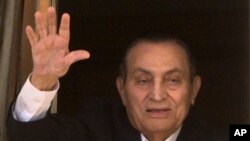Egypt’s leader for nearly 30 years, Hosni Mubarak, has died, Egyptian state television announced Tuesday. He was 91 years old.
State TV said Mubarak died at a hospital in the capital Cairo where he had undergone an unnamed operation.
Mubarak became president in 1981, following the killing of President Anwar Sadat. At first, few people thought his presidency would last. But, he remained in power until his overthrow by the military in 2011.
During his presidency, Mubarak was an important ally to the U.S. The U.S. gave his country billions of dollars in assistance. U.S. administrations considered him a force for peace and stability in the Middle East.
But, to the hundreds of thousands of Egyptians who protested for 18 days in 2011, Mubarak was a kind of dictator.
History
The son of a government worker, Muhammed Hosni El Sayed Mubarak was born in the Nile Delta village of Kafr Al-Musailha on May 4, 1928.
After Israeli warplanes destroyed much of Egypt’s air force in the Six-Day War of 1967, Mubarak became head of the air force academy. His job was to rebuild Egypt’s air force.
Sadat made Mubarak vice president in 1975.
Taking power after Sadat’s death, Mubarak faced a rebellion in the army and moved to improve relations with Arab neighbors.
Over the next 30 years, Mubarak was seen as a dependable U.S. partner against Islamic extremism. He sent Egyptian troops to be part of the U.S.-led coalition in the 1990 to 1991 Gulf war. He also made efforts to ease the Israeli-Palestinian conflict.
Within Egypt, he oversaw slow economic growth. Unlike his predecessors, Sadat and Gamal Abdel Nasser, Mubarak had no strong ideology.
Over the years, Mubarak struggled with Islamist groups. He presented himself as Egypt’s only protection against Islamic militancy and religious division.
“Nobody imagines that we can press a button and freedoms will arrive. Otherwise it would lead the country to chaos and that would be a danger to people,” Mubarak once said.
But, critics said Mubarak never had an answer to the question of how Egyptians should be governed in the future. He always refused to name a successor.
Legacy
World leaders expressed sadness at the news of Mubarak’s death.
Israeli Prime Minister Benjamin Netanyahu expressed “deep sorrow.” Palestinian President Mahmoud Abbas said Mubarak “spent his life serving his homeland and the issues of righteousness and justice in the world, with the issue of our Palestinian people at the top of them.”
Some experts say Mubarak missed chances to reform Egypt’s government. H.A. Hellyer, a scholar at the Carnegie Endowment for International Peace, wrote on Twitter, “At multiple points during Mubarak’s reign, he had the opportunity to reform the Egyptian state. He didn’t.”
Hellyer added that the January 25th uprising that led to Mubarak’s ouster “didn’t come out of nowhere — it was the result of many years of pent-up anger at how the state was failing the citizenry.”
But other experts suggest that Mubarak’s legacy is not so clear.
Steven A. Cook is a senior fellow in Middle Eastern studies at the Council on Foreign Relations. He said, “In a lot of ways, Mubarak’s legacy will be mixed. Egyptians are taking stock of their abilities to voice their views on the state of their lives, and realizing they were safer doing that in 2010 than in 2020.”
Some rights groups and activists say current president Abdel Fattah El-Sisi’s rule has proved more oppressive than Mubarak’s.
I’m John Russell.
John Russell adapted this story based on reports by the Associated Press and Reuters. Mario Ritter, Jr. was the editor.
__________________________________________________________
Words in This Story
stability -- n. the quality or state of being stable: such as the quality or state of something that is not easily changed or likely to change
predecessor – n. a person who had a job or position before someone else
ideology – n. the set of ideas and beliefs of a group or political party
successor – n. a person who has a job, position, or title after someone else : someone who succeeds another person
multiple – adj. more than one
reign – n. the period of time during which someone is in charge of a group or organization
pent-up – adj. held or kept inside : not released
legacy – n. something that happened in the past or that comes from someone in the past
take stock – v. expression to carefully think about something in order to make a decision about what to do next
We want to hear from you. Write to us in the Comments Section.





